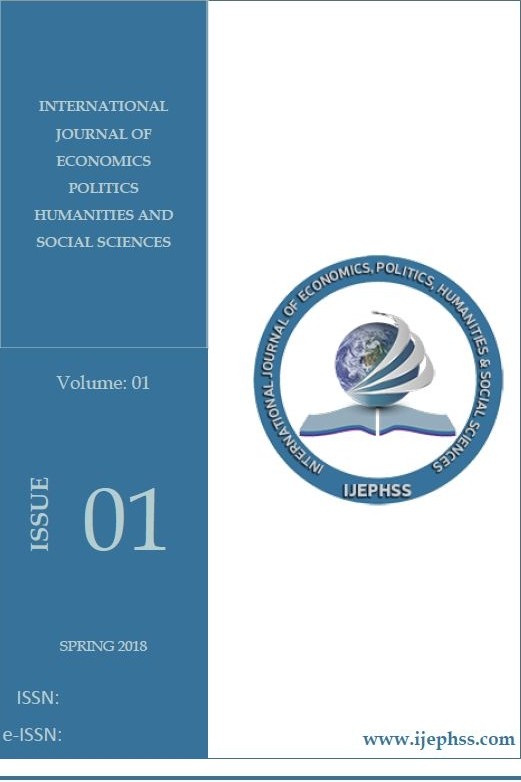A Paradox Of International (Non)Recognition: The Relationship Between De Facto States And Patron States
International system has been witnessing some jeopolitical mobilization after the second half of 20. century. These mobilities result in several conflicts which demand secession from their parent state. The conflicts which are caused by secessionist movements usually end with unilaterally secessions and these entities establish their own state without consent of parent state. After decolonization era, these secessionist movements are regarded as illegal by international community because they are not as part of decolonization movements. So these entities remain as unrecognized, in other words, de facto states. The violation of territorial integrity principle and threat to international peace and stability are main reasons that these states are regarded as illegal. But de facto states can’t achieve their statehood without a support from external sources. While external sources, in other words patron states support de facto states from several aspects, they also have a control on these entities. De facto states which are not recognized by international community also exprerience isolation politics. These isolationism make de facto state dependent on patron state’s support. But these dependences take de facto states away from international recognition. So in this study, it is aimed to analyze the relationship between de facto states and patron states and how this relationship evolves around a vicious circle.
Anahtar Kelimeler:
De Facto States, Patron States, Recognition, International Society
A PARADOX OF INTERNATIONAL (NON)RECOGNITION: THE RELATIONSHIP BETWEEN DE FACTO STATES AND PATRON STATES
International system has been witnessing some jeopolitical mobilization after the second half of 20. century. These mobilities resulted in several conflicts which demand secession from their parent state. The conflicts which are caused by secessionist movements usually end with unilaterally secessions and these entities establish their own state without consent of parent state. After decolonization era, these secessionist movements are regarded as illegal by international community because they are not as part of decolonization movements. So these entities remain as unrecognized, in other words, de facto states. The violation of territorial integrity principle and threat to international peace and stability are main reasons that these states are regarded as illegal. But de facto states can’t achieve their statehood without a support from external sources. While external sources, in other words patron states support de facto states from several aspects, they also have a control on these entities. De facto states which are not recognized by international community also exprerience isolation politics. These isolationism make de facto state dependent on patron state’s support. But these dependences take de facto states away from international recognition. So in this study, it is aimed to analyze the relationship between de facto states and patron states and how this relationship evolves around a vicious circle.
Keywords:
De Facto States, Patron States, Recognition, International Society,
___
- Berg, E., & Toomla, R. (2009), Forms of normalisation in the quest for de facto statehood, International Spectator, 44(4), 27–45
- Blakkisrud, Helge and Kolstø, Pal (2008), Living with Non-recognition: State and Nation-building in South Caucasian Quasi-states, Europe-Asia Studies, Vol 60, Issue: 3
- Caspersen, Nina (2009), Playing the Recognition Game: External Actors and De Facto States, The International Spectator: Italian Journal of International Affairs, Vol:44, Issue: 4
- Caspersen, Nina (2012), Unrecognized States: The Struggle for Sovereignty in the Modern International System, Cambridge, Polity Press.
- Caspersen, Nina (2017), Making Peace with De Facto States, Unrecognized States and Secession in the 21th Century, Ed. Martin Riegl ve Bohumil Dobos, Springer International Publishing, New York
- Crawford, James (1977), The Criteria for Statehood in International Law, British Yearbook of International Law, Vol: 48, Issue:1
- Dębski, Sławomir, Wiśniewski, Bartosz, Lorenz, Wojciech et al. (2017), EU Policy Options towards Post-Soviet De Facto States, The Polish Institute of International Affairs, Policy Paper, No. 6 (159)
- Fairbanks, Charles (2002), “Weak States and Private Armies”, Beyond State Crisis? : Postcolonial Africa and Post-Soviet Eurasia in Comparative Perspective, Ed. Mark R. Beissinger and Crawford Young, Washington, Woodrow Wilson Center Press
- Graham, B. A. T., & Horne, B. (2012). Unrecognized States: A Theory of Self-Determination and Foreign Influence. University of Southern California: Los Angeles
- Kolstø, P. (2006), The Sustainability and Future of Unrecognized Quasi-States, Journal of Peace and Research, Vol 43, No. 6Kopeček, Vincenc, Hoch, Tomáš and Baar, Vladimír (2016) De Facto States and Democracy: The Case of Abkhazia, Bulletin of Geography. Socio–economic Series, No: 32
- Kurtulus, E.N. (2005), State Sovereignty: Concept, Phenomenon, and Ramifications, Basingstoke: Palgrave Macmillan
- Lynch, Dov, (2002), Separatist States and Post Soviet Conflicts, International Affairs 78(4
- Pegg, Scott (1997), International Society and The De Facto States, Yayımlanmış Doktora Tezi, The University of British Columbia
- Pegg, Scott (2017), Twenty Years of De Facto State Studies: Progress, Problems, and Prospects, World Politics
- Riegl, Martin and Dobos, Bohumil (2017), Unrecognized States and Secession in the 21th Century, Springer International Publishing, New York
- United Nations, (1960), http://www.un.org/en/decolonization/declaration.shtml, Erişim Tarihi: 2 Mart 2018
- Zartman, I.William (1995), Putting Things Back Together, In Collapsed States: The Disintegration and Restoration of Legitimate Authority, Ed. I. William Zartmann, Boulder, London, Lyenne Rienner Publishers
- Başlangıç: 2018
- Yayıncı: Onur OĞUZ
Sayıdaki Diğer Makaleler
ÇATIŞMALARI AŞARAK DÖNÜŞTÜRMEK Çatışma Çözümüne Giriş
BEŞERİ SERMAYENİN KALKINMA ÜZERİNE ETKİSİ
YENİ DÜNYA DÜZENİNDE SANAL PARA BİTCOİN’İN DEĞERLENDİRİLMESİ
Ömer YALÇINKAYA, Muhammet Daştan, Kerem KARABULUT
KAMU YATIRIMLARI DAĞILIMININ GİNİ KATSAYISI İLE ÖLÇÜLMESİ: TÜRKİYE ÜZERİNE BİR UYGULAMA (1999-2017)
